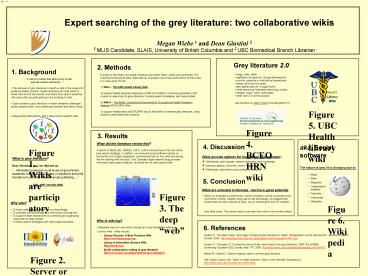Expert searching of the grey literature: two collaborative wikis
1 / 1
Title:
Expert searching of the grey literature: two collaborative wikis
Description:
GIustini D. The Web's deep, dark edge: finding the grey literature in health. ... meta-searching, federated searching, portals. images, maps, video, audiocasts ... –
Number of Views:40
Avg rating:3.0/5.0
Title: Expert searching of the grey literature: two collaborative wikis
1
Expert searching of the grey literature two
collaborative wikis
Megan Wiebe 1 and Dean Giustini 2 1 MLIS
Candidate, SLAIS, University of British Columbia
and 2 UBC Biomedical Branch Librarian
Grey literature 2.0
2. Methods
1. Background
- blogs, wikis, blikis
- digitization projects (ie. Google Booksearch)
- e-prints, preprints in institutional
repositories - listserv archives e-mails
- geo-spatial data (ie. Google Earth)
- meta-searching, federated searching, portals
- images, maps, video, audiocasts
- other web 2.0 communication
- See handout on search tools to locate greylit 2.0
A review of the library and health literature
(and other library wikis) was conducted. The
authors provide some early observations,
evaluation and cross-examination of their wikis
in a case study format 1) Wiki I The UBC
Health Library Wiki To support health
librarians attending a 2006 CHLA/ABSC Continuing
Education (CE) course on searching for grey
literature to share search strategies, and case
studies 2) Wiki II The British Columbia
Environmental Occupational Health Research
Network (BCEOHRN Wiki) To support researchers
at BCROHRN and to lead them to relevant grey
literature, using pbwiki (a web-based wiki
solution).
- a wiki is a website that allows users to add
- and edit content collectively
- The retrieval of grey literature in health is
vital to the support of evidence-based practice.
Health librarians can lead users to these
hard-to-find documents, and share their search
expertise with each other by participating in the
building of wikis. - Open access to grey literature in health
presents challenges and/or opportunities new
publishing channels and search tools a
fragmented bibliography, and a deep
hard-to-search Web.
Figure 5. UBC Health library wiki
Figure 4. BCEOHRN wiki
3. Results
- What did the literature review find?
- A search of MEDLINE, INSPEC, ERIC, LISTA
retrieved fewer than ten items see search
strategy. In addition, we reviewed social
software activity on technorati and Google
blogsearch, and learned that our two wikis are
among the few dealing with this topic. One
Canadian legal research blog provides information
about grey literature, but there are no other
greylit wikis. - Who is wiki-ing?
- Wikipedia has over one million articles and uses
MediaWiki software
4. Discussion
aka. Social software The nature of grey lit is
changing due to
Figure 1. Wikis are participatory
- Wikis provide options for knowledge management
- Centralized, open access shared information and
knowledge - Learning objects, pre-prints, works in progress
- Pathfinders, start-heres and pointers to
research. - .
What is grey literature? Grey literature may be
defined as information produced on all levels
of government, academia, business and industry in
electronic and print formats not controlled by
commercial publishing. ICGL 1997 (revised
2004)
- Blogs
- Blikis
- Blogcasts
- Collaborative software
- Podcasts
- Videocasts
- Wikipedia
5. Conclusion
Wikis are untested in libraries - but have great
potential
Figure 3. The deep web
- While our evaluation is preliminary, further
evaluation will be conducted at six and twelve
months. Despite rising use of wiki technology, we
suggest that researchers are still unaware of
wikis, how to contribute to them or whether they
have value. The authors plan to promote their
wikis in the months ahead.
- Why wiki?
- To share case studies, expertise and knowledge
- To evaluate wiki technology as a community
building tool - To support health researchers by collecting and
organizing - resources for easy access
- To share search strategies with other health
librarians.
Figure 6. Wikipedia
6. References
GIustini D. The Webs deep, dark edge finding
the grey literature in health. Presentation on
the Internet B.C. Ministry of Health. October
2006. http//weblogs.elearning.ubc.ca/googleschola
r/archives/031841.html Giustini D, Thompson D.
Finding the hard-to-finds searching for the grey
literature. 2006 CHLA/ABSC Continuing Education
(CE) course, May 11th, 2006. http//toby.library.u
bc.ca/subjects/subjpage2.cfm?id877 Wiebe M,
Giustini D. Search engines used to retrieve grey
literature. UBC Health Library wiki. Wikis in
health libraries. Wiki on the Internet.
Accessed on http//hlwiki.slais.ubc.ca/index.php
?titleWikis
Figure 2. Server or web-based software































